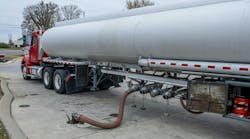Fuel hedging – buying fuel at a contracted set price for a year or more – is one method fleets use to help control fuel costs.
“I think you need a fuel hedge strategy, not a fuel surcharge, to control fuel costs,” Richard Bell, president of consulting firm Bell & Company, told Fleet Owner. “If you burn 42,000 gallons of fuel a month, you may want to buy fuel using future contracts and [thus] average your cost of fuel. Think of it as dollar averaging, when you buy mutual funds on a monthly basis.”
However, not all fleets are sold on hedging to control costs. “We made a decision to abandon fuel hedging in the mid-1990s,” says John Burton, vp-marketing for SCS Transportation. “We used both surcharges and hedging to control fuel costs back then, but it sent a mixed message to customers. With hedging, it looked like we were making a profit on fuel costs. With surcharges, we don’t gain anything – that makes fuel costs very transparent to the customer.”
Betty Simkins, a finance professor at Oklahoma State University, adds that there are fees involved in setting up fuel hedging contracts and that the financial state of a company trying to hedge its fuel costs can influence the price they’ll pay.
“It’s more difficult if you’re not investment grade,” she explains. “You’ll have to post more collateral to get the hedge contract. That’s why trucking companies tend to stick more with surcharges— they are more able to pass on the higher cost of fuel, as compared to the airline industry, which can’t.”
Credit rating agency Standard & Poor’s also believes hedging doesn’t offer fleets the best method for recouping the higher cost of fuel.
“A company will pay or receive the difference between the hedge price and the actual price of [diesel fuel] during the specified period covering a specified number of gallons,” said Kenneth Farer, an analyst with S&P, in a report published this month on how trucking companies are dealing with the high cost of diesel.


